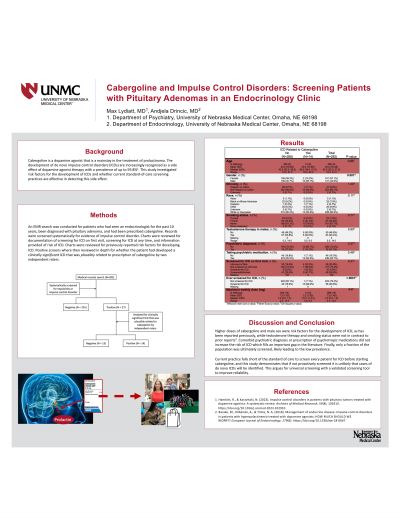Psychopharmacology and Toxicology
(132) Cabergoline and Impulse Control Disorders: Screening Patients with Pituitary Adenomas in an Endocrinology Clinic


Max Lydiatt, MD (he/him/his)
Resident
University of Nebraska Medical Center
Omaha, Nebraska- AD
Andjela Drincic, MD
Professor
University of Nebraska Medical Center
Omaha, Nebraska
Presenting Author(s)
Co-Author(s)
Background/Significance: Cabergoline is a dopamine agonist that is a mainstay in the treatment of prolactinoma. The development of de novo impulse control disorders (ICDs) are increasingly recognized as a side effect of dopamine agonist therapy with a prevalence of up to 59.8% (Hamblin, 2023). This study investigated risk factors for the development of ICDs and whether current standard-of-care screening practices are effective in detecting this side effect.
Methods: Ethical approval was obtained from IRB. The electronic medical record was searched for patients seen by an endocrinologist who carried a diagnosis that fell under the category of “Benign neoplasm of pituitary gland (D35.2*)” and were prescribed Cabergoline at any time. Each record was systematically screened for risk factors and for evidence of ICD. Endocrinology notes were reviewed to determine if patients were screened for ICD or if a discussion or risk of ICD was recorded both at first visit and at each subsequent visit.
Results: Out of 282 patients on cabergoline, 14 (5%) developed clinically significant, cabergoline-related ICDs. The median age was 43 with 43% female and 57% male. 86% of patients who developed ICD were male, vs. 41% without ICD (p=0.001). There was no significant association between impulsivity and race (p=0.17) or ethnicity (p=1.00). There was no association between smoking status and ICD development (p=0.77). The median maximum weekly cabergoline dosage was 1mg for non-ICD cases and 1.5mg for positive ICD cases (p=0.01). There was no significant association between testosterone therapy and impulsivity in males (p=0.80). 27% of patients had psychiatric diagnosis, which was not significantly associated with ICD (p=0.37). 84% of patients ever took psychiatric medication which was not significantly associated with ICD (p=0.48). Only 26.6% were screened or informed of ICD risk on first visit, with a significant association between screening and ICD development (p< 0.0001). Only 17% of non-ICD patients were screened, while 93% of ICD patients were screened.
Discussion: Higher doses of cabergoline and male sex were risk factors for the development of ICD, as has been reported previously, while testosterone therapy and smoking status were not in contrast to prior reports (Barake, 2018). Comorbid psychiatric diagnosis or prescription of psychotropic medications did not increase the risk of ICD which fills an important gap in the literature. Finally, only a fraction of the population was screened, likely leading to the low prevalence.
Conclusion/Implications: Current practice falls short of the standard of care to screen every patient for ICD before starting cabergoline, and that if not proactively screened it is unlikely that cases of de novo ICDs will be identified. This argues for universal screening with a validated screening tool to improve reliability.
References:
Hamblin, R., & Karavitaki, N. (2023). Impulse control disorders in patients with pituitary tumors treated with dopamine agonists: A systematic review. Archives of Medical Research, 54(8), 102910. https://doi.org/10.1016/j.arcmed.2023.102910
Barake, M., Klibanski, A., & Tritos, N. A. (2018). Management of endocrine disease: Impulse control disorders in patients with hyperpolactinemia treated with dopamine agonists: HOW MUCH SHOULD WE WORRY? European Journal of Endocrinology, 179(6). https://doi.org/10.1530/eje-18-0667
Presentation Eligibility: Not previously published or presented
Diversity, Equity, and Inclusion: One aspect of this study investigated whether race and ethnicity were risk factors for the development of a potentially devastating medication side effect as had been previously evaluated in the literature, and its negative findings provide further evidence that treatment of prolactinoma should not vary based on race or ethnicity. Furthermore, the results of this study directly support the development of practices to promote non-judgmental and egalitarian screening approach that serves to further reduce the risk of bias against historically marginalized groups

